ARTS AND LETTERS REVIEW

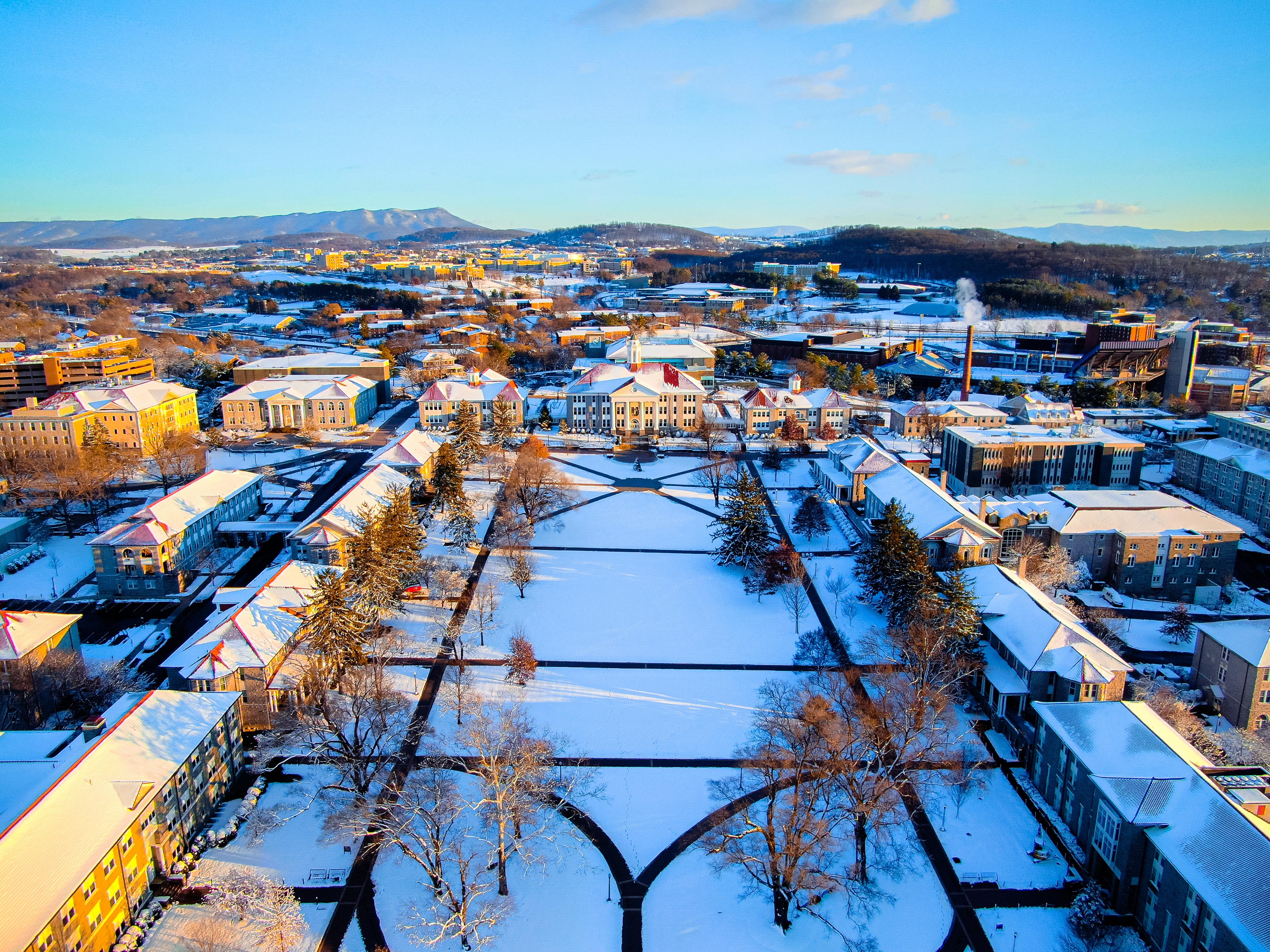
January 2023 | Issue 2
¡BIENVENIDOS! Familiar partners and new initiatives across the college CENTERS & INSTITUTES CAPITAL CONNECTIONS Celebrating 25 years of the Washington Semester Program Hosting the first JMU Latinx Conference SOMOS

1 | JMU COLLEGE OF ARTS AND LETTERS CENTERS
Madison Center for Civic Engagement Furious Flower Poetry Center African, African American, and Diaspora (AAAD) Studies Center Mahatma Gandhi Center for Global Nonviolence Innovation Center for Youth Justice American Political Reform & Innovation Lab (APRILab) 3 5 6 7 8 9 WELCOME Contributors Introduction 2 2 Celebrating 25 Years of Connections in D.C. Week of Giving REACHING NEW HEIGHTS 17 18
Introducing the Director of Professional Development and Engagement Faculty Fellows & Supporting Digital Initiatives 15 16
AFFAIRS New Legal Studies Minor Announcing the Alumni Law Board Student Showcase - Thriving in Anthropology New Dukes Visit Campus JMU Latinx Conference Faculty Focus - Dr. Tiffany González 10 10 11 12 13 14 SOMOS
& INSTITUTES
IN THE DEAN'S OFFICE
FALL
CONTRIBUTORS
Arts and Letters Review,
Welcome to the second issue of the which features many exciting developments since our first issue in August This issue focuses on some of the centers and institutes housed in the College of Arts and Letters, where students and faculty in the college work across traditional disciplinary boundaries to expand knowledge and improve teaching In Arts and Letters, each center or institute is led by a tenured faculty member from one of our departments This structure ties our centers closely to the central work of teaching and research in the college, ensuring close collaboration between these “think tanks” and the areas of study in which students obtain their degrees. Deeply reciprocal relationships emerge from these collaborations
Last year, among many other wonderful hires, we completed successful national searches for two new faculty leaders, one to lead our newly formed center for African, African American, and Diaspora Studies, and one to take up a position as associate director for our Black Poetry center, the Furious Flower, now in its 28th year. You can read about both centers in the pages that follow, as well as several others.
Whether led by a long-serving member of our faculty or a newly recruited one, our centers and institutes have grown in number and stature in the last few years This growth represents an awareness in the College of Arts and Letters of the importance of interdisciplinarity, the idea that the problems besetting us require multiple perspectives and frameworks From racial and social injustice to the special concerns of Black literary experience globally, from hyperpartisanship to governmental dysfunction, and from youth incarceration to conflict resolution around the globe, our centers reflect the leading edge of scholarship, teaching, and service They are at once academic powerhouses and forces for broad change in our world
At JMU we urge students to be the change they want to see in the world. I hope you’ll agree that the faculty, staff, and student news in this issue brightly reflects that spirit
 Dr. Robert D. Aguirre, Dean of the College of Arts and Letters
Dr. Melinda Adams, Associate Dean, Professor of Political Science
Dr. Robert D. Aguirre, Dean of the College, Professor of English
Becca Evans, Communications & Marketing Specialist, College of Arts and Letters
Karina Kline-Gabel, Assistant Dean, Lecturer in Foreign Languages, Literatures, and Cultures (Spanish)
Megan Nicole Medeiros Communications & Marketing Specialist, Furious Flower Poetry Center
Dr. Siân White, Associate Dean, Professor of English
Shannon Wilson Director of Professional Development and Engagement
Laura Wisman Administrative Assistant, College of Arts and Letters
Dr. Robert D. Aguirre, Dean of the College of Arts and Letters
Dr. Melinda Adams, Associate Dean, Professor of Political Science
Dr. Robert D. Aguirre, Dean of the College, Professor of English
Becca Evans, Communications & Marketing Specialist, College of Arts and Letters
Karina Kline-Gabel, Assistant Dean, Lecturer in Foreign Languages, Literatures, and Cultures (Spanish)
Megan Nicole Medeiros Communications & Marketing Specialist, Furious Flower Poetry Center
Dr. Siân White, Associate Dean, Professor of English
Shannon Wilson Director of Professional Development and Engagement
Laura Wisman Administrative Assistant, College of Arts and Letters
ARTS AND LETTERS REVIEW | 2
The James Madison Center for Civic Engagement
The James Madison Center for Civic Engagement made a splash on Constitution Day 2022 by unveiling a special purple-bound edition of the United States Constitution. A hit with students, faculty, and alumni alike, the pocket constitution has “sold out” and the center has ordered another print run for fundraising and programming.

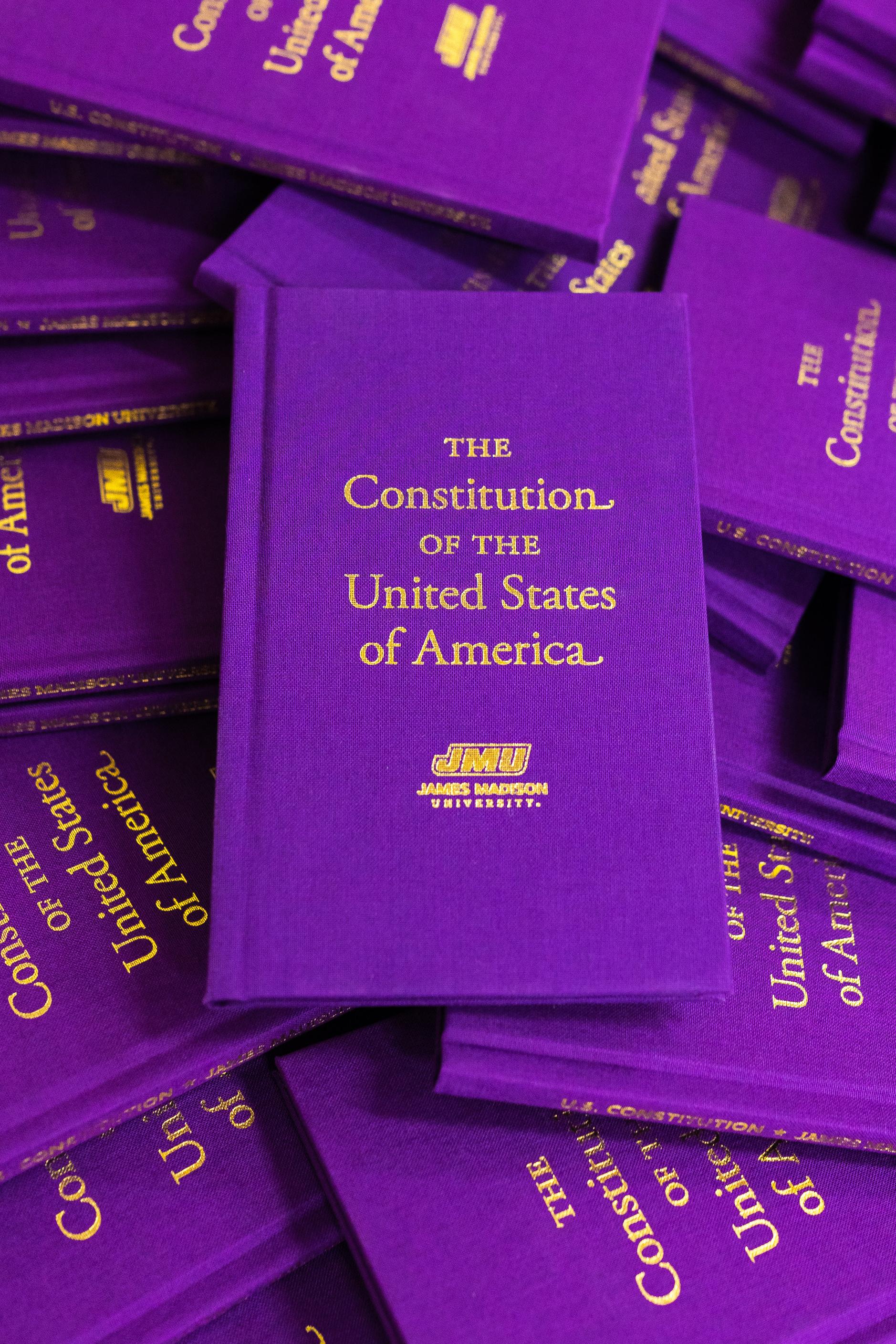
The center came into the fold of the College of Arts and Letters in late 2021. Dr. David C. Kirkpatrick, Associate Professor of Religion, was appointed interim Executive Director in May of 2022. Dr. Kara Dillard was subsequently appointed as interim Associate Director, bringing with her fifteen years of experience in the deliberative democracy and public engagement fields. She is Assistant Professor in Communication Studies and a CoDirector at the JMU Institute for Constructive Advocacy and Dialogue.
Dillard will lead the National Week of Deliberation on campus this April. “The event offers a chance to engage students in discussions about ‘wicked’
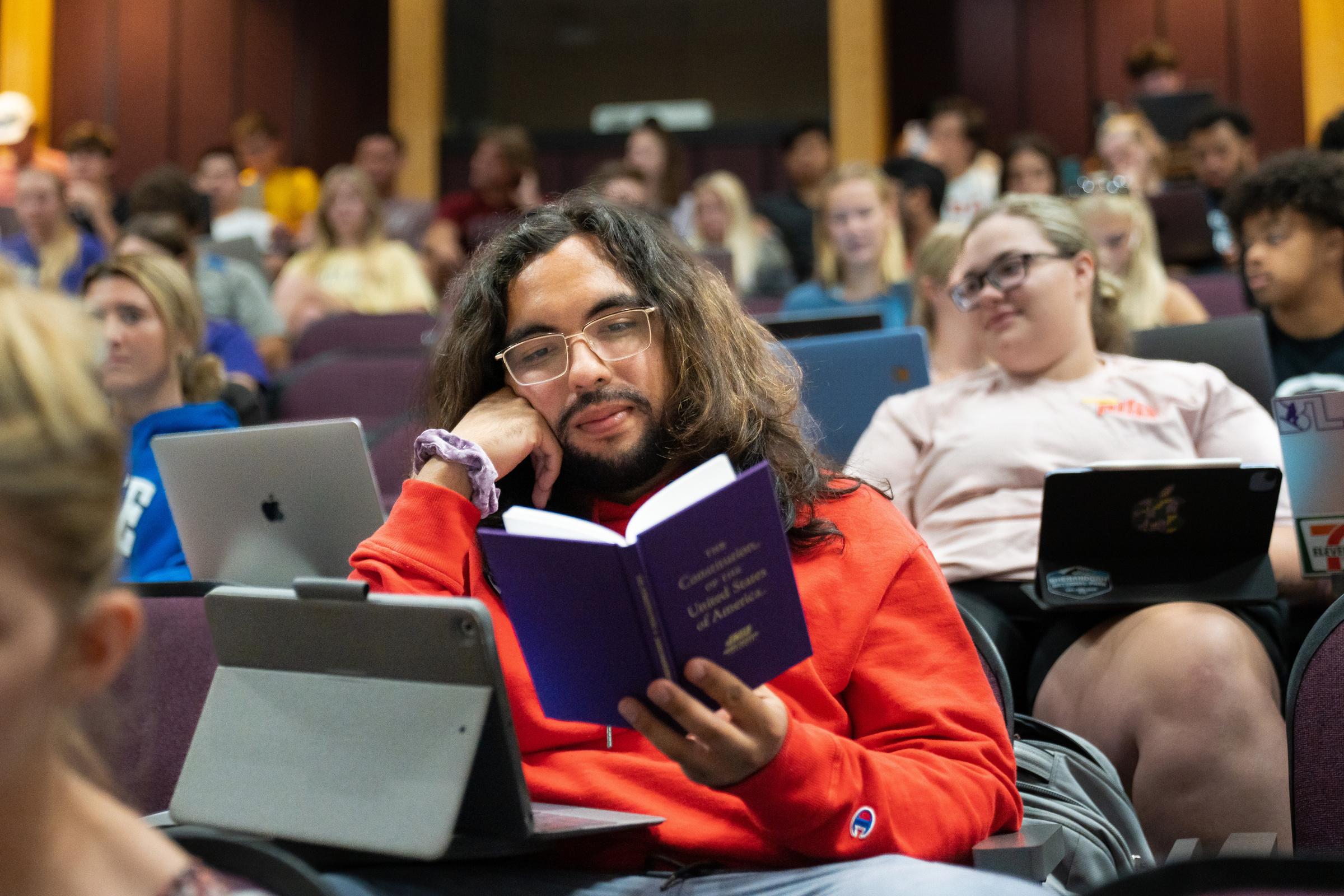
issues like climate change, inequality, immigration, and more,” says Dillard. “[This] is an opportunity to connect JMU students with students across the nation, for small-group forums facilitated by other undergraduate students.” The National Week of Deliberation is meant to spark students’ civic imagination and make them feel heard and respected, even as they discuss difficult problems.
The center has big plans for expanding its scope
3 | JMU COLLEGE OF ARTS AND LETTERS
Education Institute to launch the Civic History Exchange program in Spring 2024. The program focuses on African American history and civil rights through student exchange and on-site civic learning. JMU students will have the opportunity to explore the Martin Luther King, Jr. Papers at Stanford, while Stanford students will conduct onsite research at Montpelier, Monticello, and the Smithsonian National Museum of African American History and Culture.
The center also supports Dukes Vote, a student-led initiative that works with academic and student affairs, and with community partners, to enhance JMU's civic engagement mission by preparing students for an active and informed role in democracy. Recently, the program launched a student-led podcast, Dukes Vote Podcast, to
discuss civic engagement at JMU, and hosted Traveling Town Halls for City Council candidates to speak with students in residence halls. A School Board Candidate Forum offered candidates their only chance for public debate during this year’s election cycle.


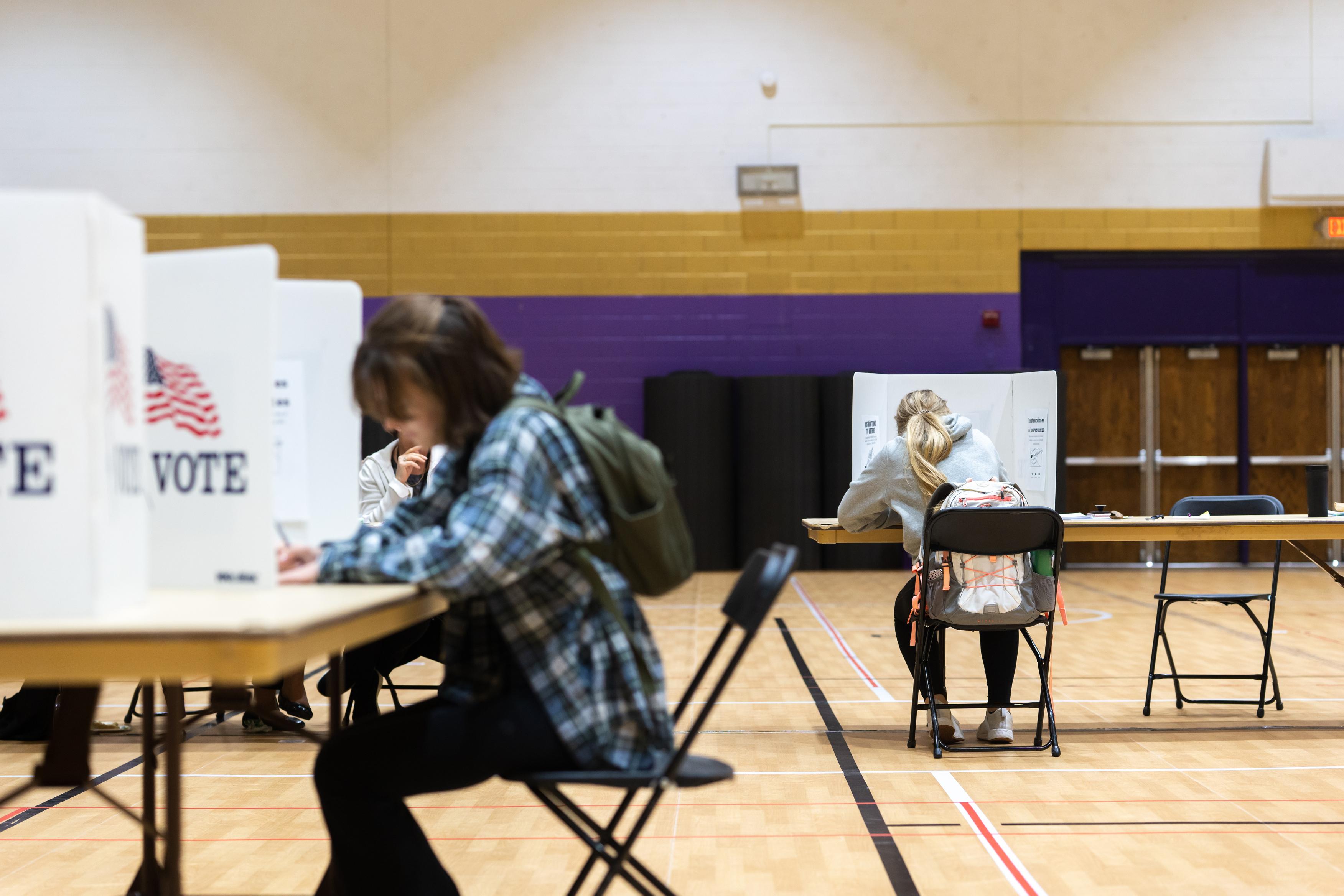
JMU and the Madison Center for Civic Engagement have been named a third partner institution for the influential Institute of Civic Studies and Learning for Democracy (ICSLD), joining North Carolina State University and University of Augsburg (Germany). In September 2023, JMU will host the next institute, an intensive 10-day seminar and residential retreat that brings members of the JMU community together with influential global leaders from a range of professions and disciplines to grapple with the pressing challenges of modern democracy and civic engagement.
“We are making JMU a place where global conversations happen,” said Kirkpatrick. “JMU has long been a national leader in civic engagement under President Jon Alger’s leadership. Becoming a partner institution for and hosting the ICSLD reflects our goal at the Madison Center of leading national and international conversations around strengthening our democracy for the common good.”
To learn more about the center’s many other initiatives and accomplishments, visit its website at www.jmu.edu/civic.
ARTS AND LETTERS REVIEW | 4
Furious Flower Poetry Center
Under the new leadership of Executive Director Lauren K. Alleyne, Professor of English, the Furious Flower Poetry Center (FFPC) has expanded its commitment to celebrating and educating the public about Black poetry by broadening the range of poets participating in its programs.


“As a Trinidadian-born immigrant, it’s important to me to ensure that the ‘Black’ in our mission is inclusive of poets and work outside of the United States,” said Alleyne. “I want to bring knowledge of those poets to American audiences, give those poets an opportunity to expand their platforms in the U.S. and, through this exchange, reveal diasporic connections.”
In September, a group of interdisciplinary students from the University of Liberia and the University of Virginia visited Furious Flower Poetry Center. The group, sponsored by the U.S. Department of State and the U.S. Embassy in Monrovia, Liberia, visited with the UVA Landscape Studies initiative Project Manager Allison James. Alleyne and Assistant Director L. Renée introduced Furious Flower’s rich history and current
By Megan Nicole Medeiros
participating in the series as part of the annual African, African American, and Diaspora (AAAD) Studies Conference. Mervyn Taylor, a will give a reading in March. All of these events are free and open to the public, and will be Livestreamed on the center’s Facebook page and posted on its YouTube
In mid-December, Furious Flower received a $50,000 ‘Equity in Verse’ grant from the Poetry Foundation, which “supports nonprofit and literary organizations [...] led and staffed by people of color.” They will use this grant next summer to convene educators who will create an open-access Furious Flower syllabus to be taught nationwide leading up to the fourth Furious Flower Conference in 2024.
5 | JMU COLLEGE OF ARTS AND LETTERS
rican, African American, d Diaspora (AAAD) udies Center
In Fall 2022, JMU welcomed a new director of the African, African American, and Diaspora (AAAD) Studies Center, Dr. Delores B. Phillips, who has her faculty appointment as a tenured Associate Professor in English. “It was the welcome I received in my first Africana Studies Workshop that cemented my commitment to AAAD,” Phillips said. “Since then, I’ve learned of the wealth of AAAD’s activities at and beyond JMU and immediately wanted to contribute to its wide-ranging network of courses, study abroad opportunities, conferences, workshops, sister universities, and JMU faculty, staff, students, and community members.”
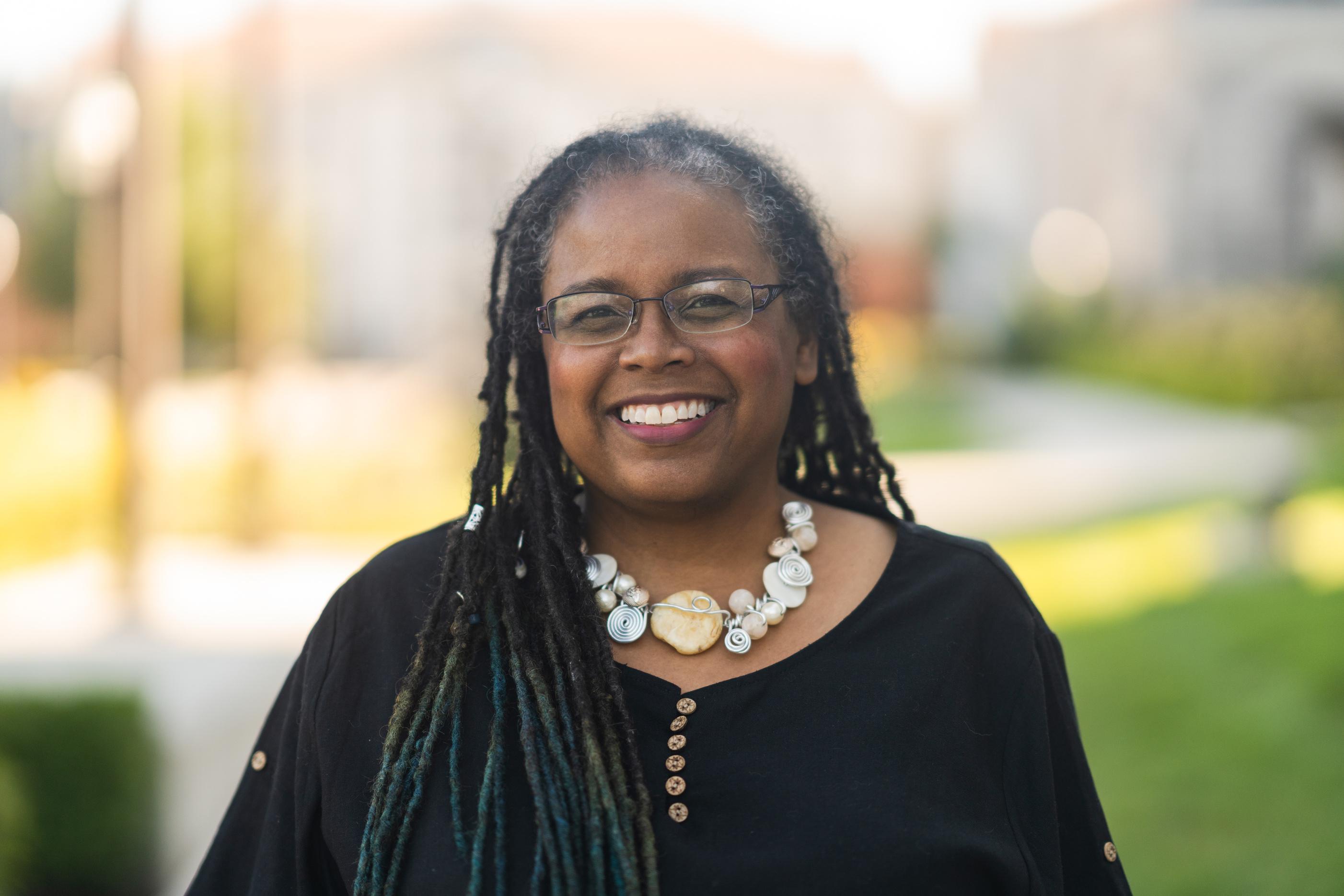
AAAD provides to the JMU community a wealth of interdisciplinary knowledge, programming, and initiatives related to Black peoples, histories, cultures, languages, economics, philosophies, ideas, and socio-political structures. It is built on the principle of effective interdepartmental cooperation, particularly regarding core curriculum courses on Africa and the African Diaspora. With over 65 affiliated faculty members drawn from a variety of departments and disciplines across campus, AAAD is a force on JMU’s campus.
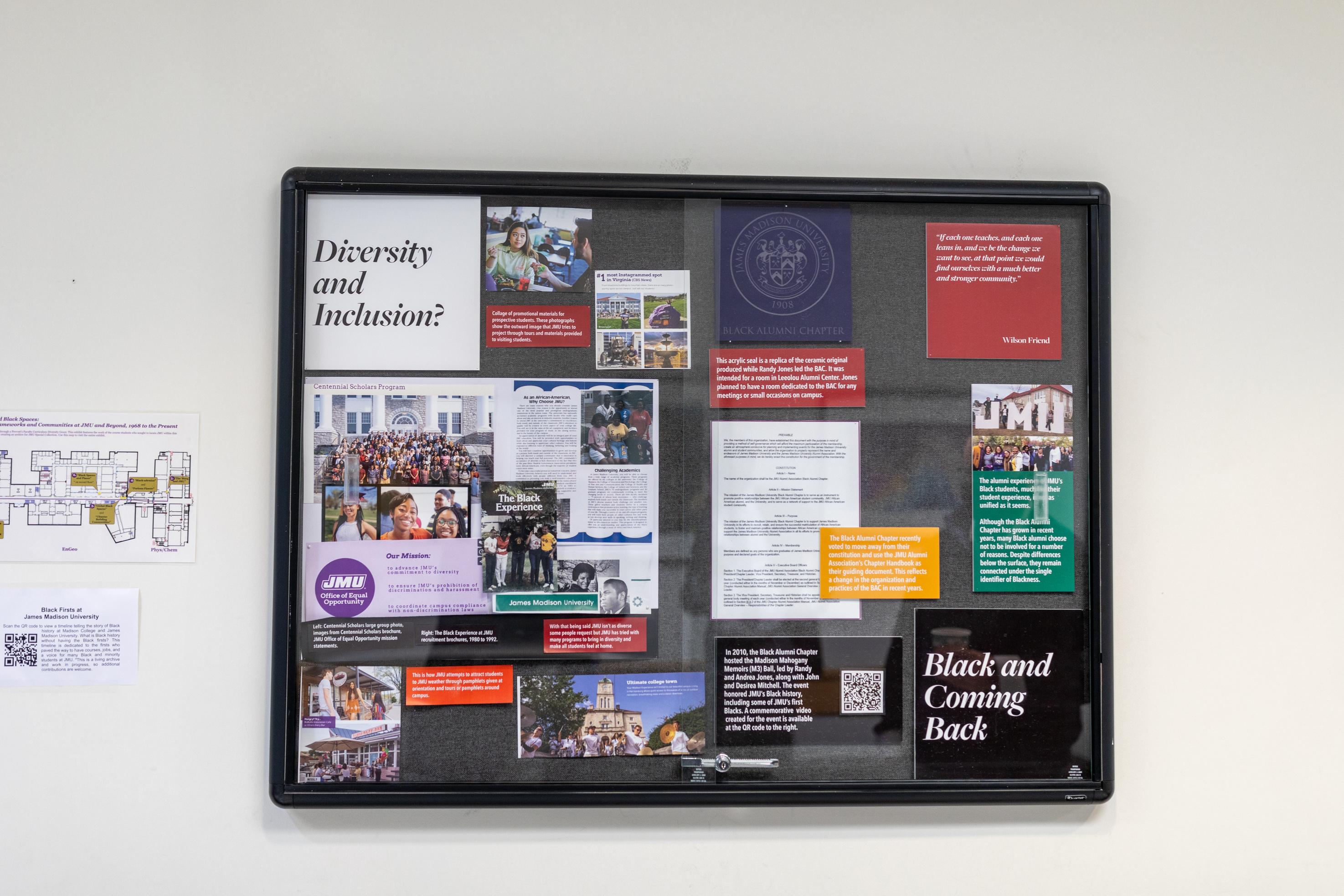
The next AAAD event is almost here — every February, the program hosts scholars from across the world and across the humanities, social sciences, STEM, the arts, and business, as well as artists and activists at its Annual African, African American, and Diaspora Studies Interdisciplinary Conference. The event offers an energizing opportunity for cross- and inter-disciplinary research exchange, debates, and networking. This year’s conference, which takes place February 1417, 2023, is organized around the themes of “Roots, Limbs, and Leaves” and will use a hybrid format to allow in-person and virtual participation and attendance.
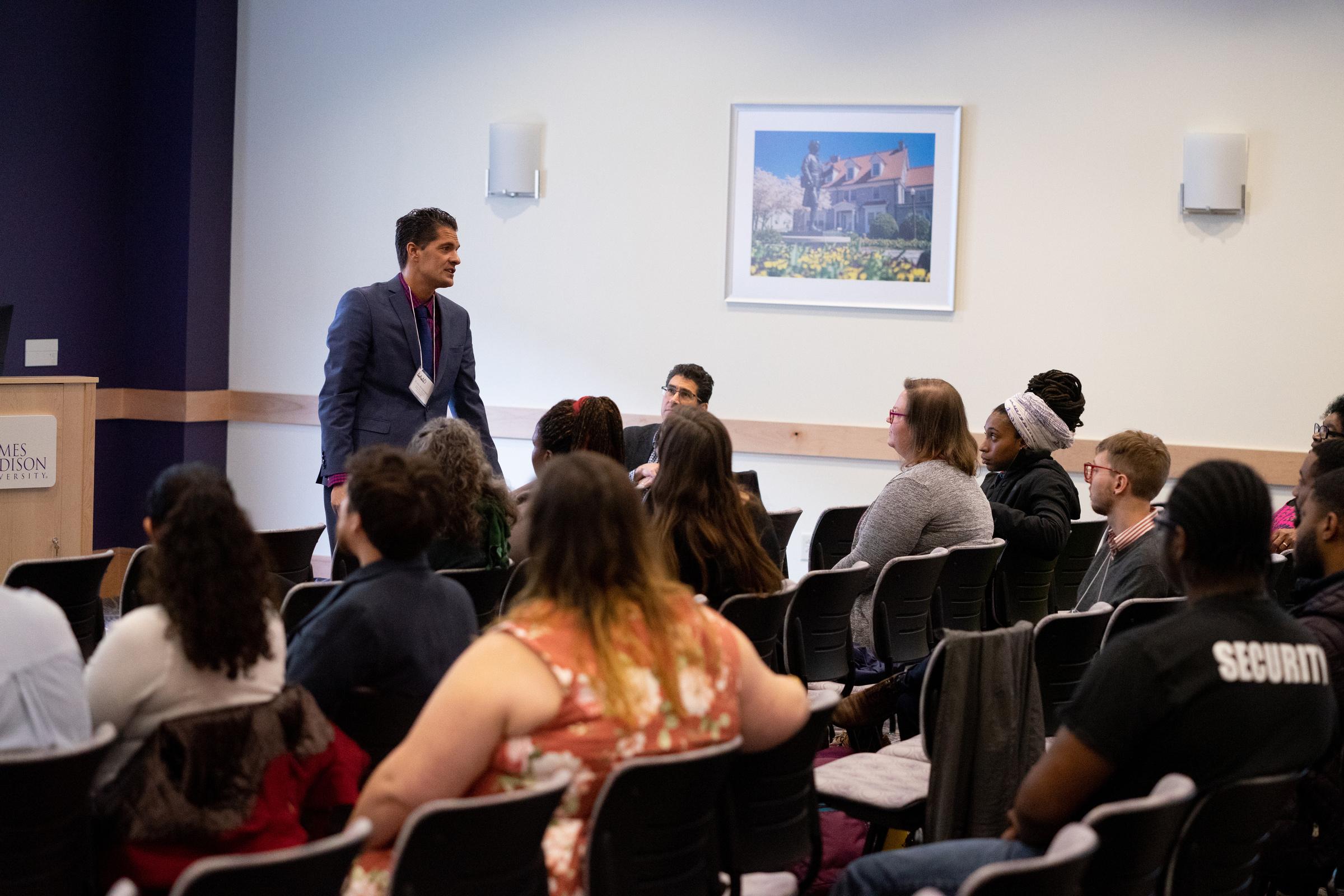
ARTS AND LETTERS REVIEW | 6
Session during 2019 AAAD Conference in Holland Yates Hall
Mahatma Gandhi Center for Global Nonviolence
The Mahatma Gandhi Center for Global Nonviolence, established in 2005, is a local and global hub dedicated to advancing the understanding of justice and nonviolence through individual and collaborative endeavors. The current director, Dr. Taimi Castle, Professor of Justice Studies, succeeded the late Terry Beitzel in 2021.
“My primary goal with the Gandhi Center has been to continue the partnerships and programs that Terry developed while also expanding the research initiatives,” Castle says. “We are interested in collaborating on research with faculty across the university in the broad areas of justice and nonviolence.”
The Beitzel Symposium, created in honor of the late director, was first held this past September. The three-day event brought distinguished scholars and practitioners of nonviolence to campus for public lectures, seminars, panel discussions, and more. During the symposium, the second-ever Mahatma Gandhi Center
National Nonviolence Award was given to David Hogg, graduate of Marjory Stoneman Douglas High School, and the organization March For Our Lives, to recognize their commitment to education, civic engagement, and nonviolent direct action against gun violence.

The center also sponsors the Beitzel Memorial Scholarship. Recipients are first-generation Justice Studies students who demonstrate a strong interest in nonviolence and social justice through a commitment to service or research.
Home to the International Journal on Responsibility (IJR), a peer-reviewed, interdisciplinary forum for theoretical, practical, and methodological explorations of responsibility, the center is a frontrunner in its field. Animated by the question “Who or what is responsible to do what for whom?", IJR encourages research and reporting about how responsibility relates to both individual and broad, public concerns, past, present, and future.
The center is currently accepting applications for a research fellowship in the Justice and Nonviolence Research lab to bolster JMU’s research mission and R2 status by supporting scholarship that leads to publication.

7 | JMU COLLEGE OF ARTS AND LETTERS
Innovation Center for Youth Justice
With generous support from the Commonwealth of Virginia, JMU is proud to launch the nation’s first Innovation Center for Youth Justice. The new center represents a collaboration among the departments of Justice Studies and Social Work, Dean Robert Aguirre (Arts and Letters), Dean Sharon Lovell (Health and Behavioral Studies), and noted JMU alum John Tuell (Social Work, ‘79), founder and Executive Director of the Robert F. Kennedy National Resource Center for Juvenile Justice.
For Tuell, a well-known expert in this field, the center offers a unique opportunity to transform the youth justice system based on research in adolescent brain development. The goal is to increase positive youth opportunities, strengthen accountability, and enhance community safety. As Tuell indicates, “We seek a fair, just, and equal opportunity for our nation’s most vulnerable youth to realize a future we would want as if they were our own.”
Heading the center will be Dr. Rita Poteyeva, Associate Professor of Justice Studies, who will oversee several initiatives:
Expanding the cross-disciplinary Youth Justice minor, housed jointly in Arts and Letters and Health and Behavioral Studies; Seeking external funding to support student and faculty research about youth justice practice and policy; Establishing a learning network to offer training and field-related professional development to a current and future youth justice workforce; Launching a new, expansive internship program for JMU students, which draws on Tuell’s extensive connections to youth justice leaders and practitioners in jurisdictions across the United States.
The center’s equal emphasis on cutting-edge research, undergraduate education, and workforce development will benefit the Commonwealth and increase JMU’s national visibility as a research university known for producing thoughtful, principled, and careerready graduates.
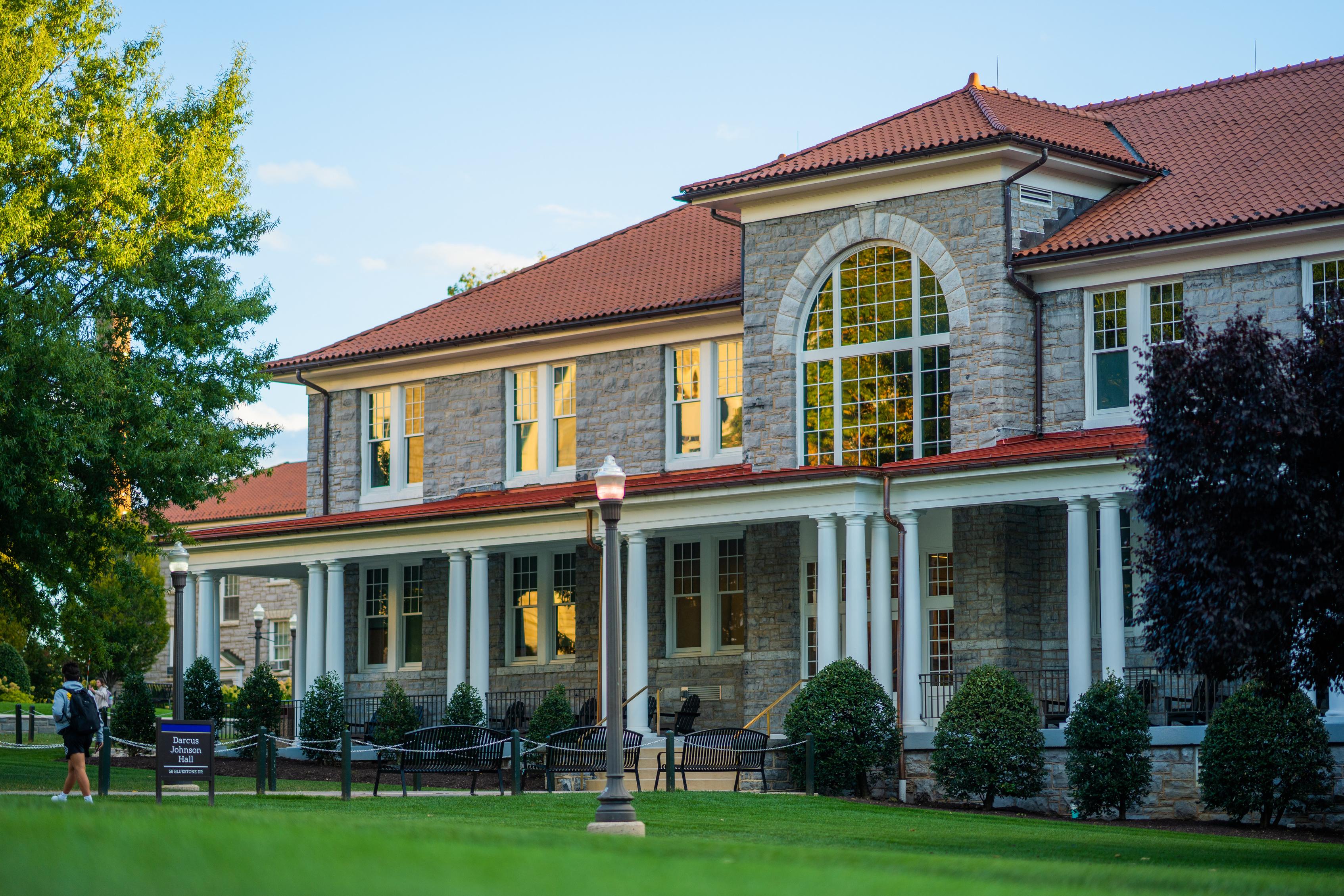
ARTS AND LETTERS REVIEW | 8
American Political Reform & Innovation Lab (APRILab)

Dr. Timothy LaPira, Professor of Political Science at James Madison University, serves as the founding director of the American Political Reform & Innovation Lab (APRILab), housed in the College of Arts and Letters. A newly created nonpartisan, civic- and community-engaged political science and data science research lab, APRILab produces original, evidence-based research on institutional political reform. The lab collaborates with internal and external experts in the national political reform advocacy community.
LaPira studies Congress and its staff, interest groups and the lobbying profession, and political elite behavior. In 2019, he was the American Political Science Association Public Service Fellow at the House Select Committee on the Modernization of Congress. He also received the 2022 College of Arts and Letters Madison Scholar Award for outstanding scholarly achievements.
“I’ve done something like this lab for my entire career at JMU, and I thought it would be a great opportunity to continue doing so, and to offer students the opportunity to experience this work as well,” said LaPira. APRILab’s research is meant to address significant, real-world problems posed by institutional dysfunction, democratic backsliding, and unequal political influence.
Several student assistants are helping LaPira build the foundations of the lab. Riley Miller (‘23) joined the lab because “It seems like it’s research that hasn’t been investigated as much, and it’s cool to be a part of something that will be used to understand the effectiveness of our government for as long as we continue on.”
Another student, Abigail Barden (‘24), is grateful for the opportunity to gain practical experience:
“Political Science doesn’t often have research labs and it’s a very interesting thing to be a part of. It’s giving me a lot of really good experience in the field.”
APRILab director and several student assistants; from left to right: Ryley Miller ('23), Dr. Tim LaPira, Laura Reinert ('23M), Abigail Barden ('24), and Hollie Briones ('24).
9 | JMU COLLEGE OF ARTS AND LETTERS
New Legal Studies Minor
The College of Arts and Letters is happy to announce the launch of a new Legal Studies minor beginning Fall 2023. Open to any interested students, the minor will offer a valuable curricular option for students interested in a legal career.
The 18-credit minor provides a multidisciplinary perspective with contentand skills-based courses offered by nearly all of the departments within the college, including Communication Studies; English; Foreign Languages, Literatures, and Cultures; History; Justice Studies; Media Arts and Design; Philosophy and Religion; Political Science; and Writing, Rhetoric and Technical Communication.
From their location in the Arts and Letters Dean’s Office, Associate Deans Melinda Adams and Traci Zimmerman will serve as advisors.
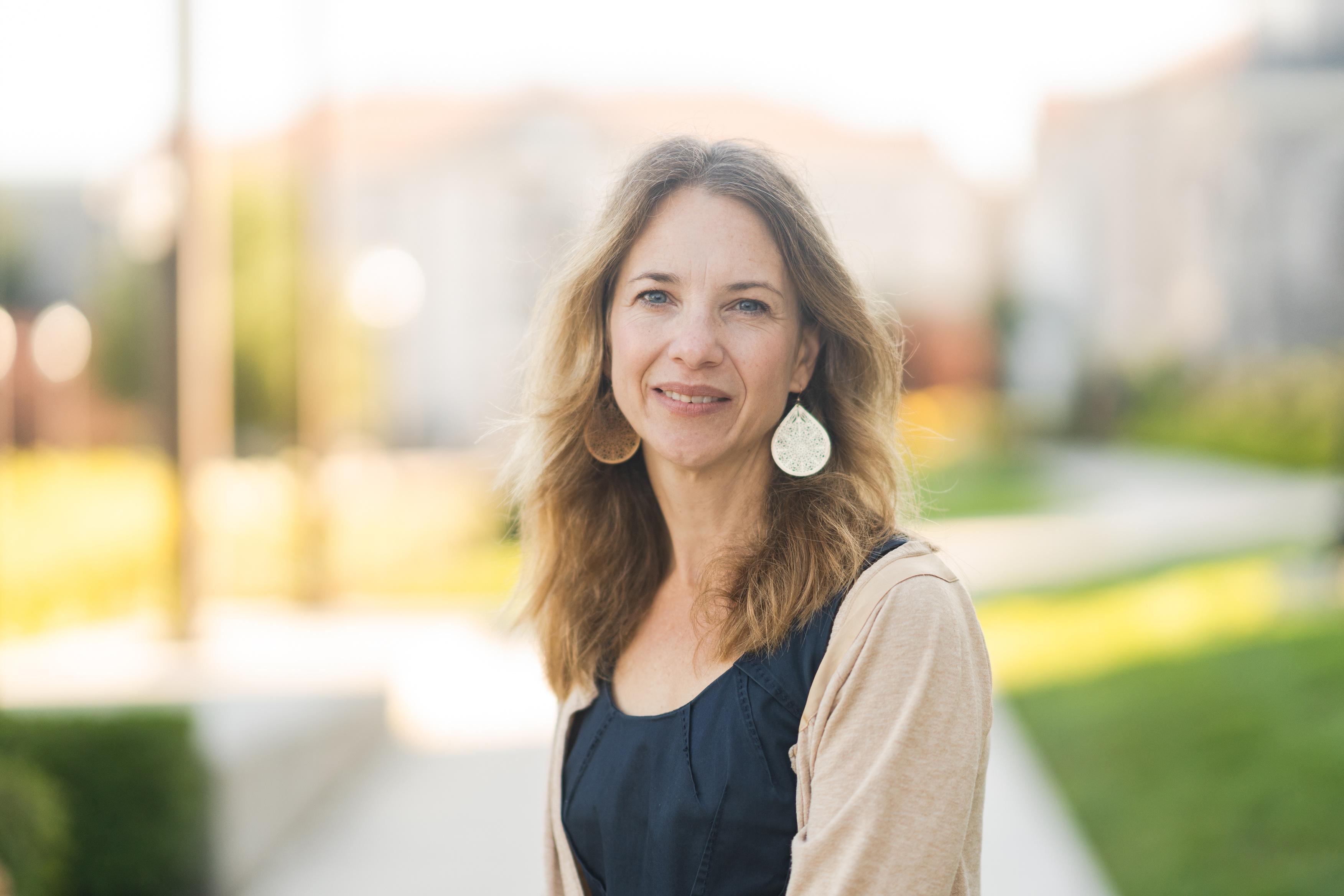

The JMU Alumni Law Board held its inaugural meeting in October after a successful networking event for students interested in learning about law school and legal careers. The 15-member board is composed of JMU alumni holding or pursuing a JD degree, and seeks to facilitate and strengthen relationships among students, alumni, and faculty.
The Board has committees: Student Outreach and Programming organizes programming for students interested in law school and legal careers, while the Alumni Outreach and Networking Committee connects JMU alumni lawyers. The Fundraising Committee provides financial support to pre-law students and has established a new scholarship fund to compensate students for participation in unpaid internships in the legal field.
We invite all JMU Alumni Lawyers to connect through the LinkedIn and/or Facebook groups.

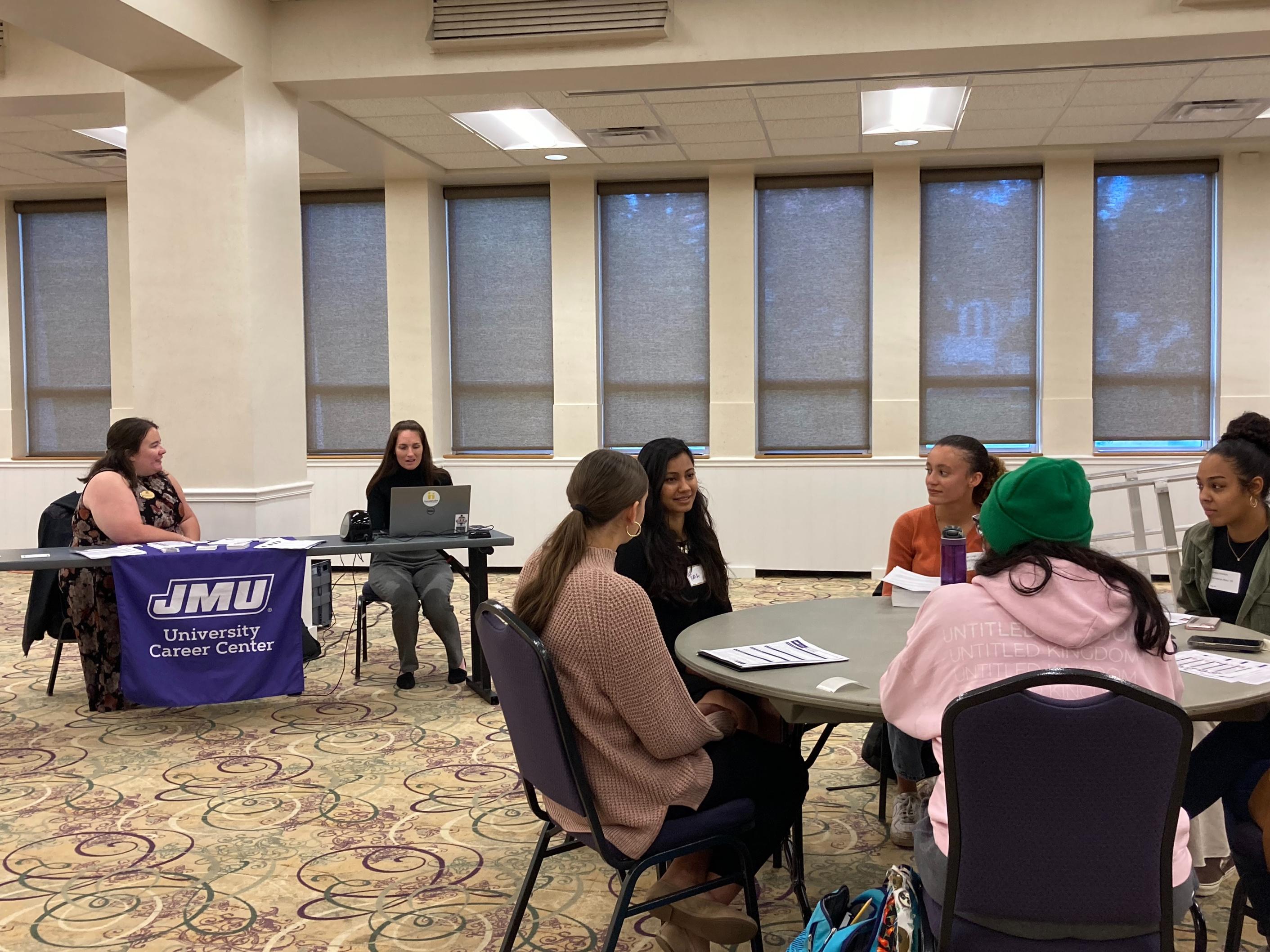
ARTS AND LETTERS REVIEW | 10
the Pre-Law Program Fund Today!
Tuba Ahmed ('12) speaks with several JMU pre-law students.
Support
Associate Deans Traci Zimmerman (left) and Melinda Adams (right).
STUDENT SHOWCASE
Thriving in Anthropology
Anthropology, a broad discipline focusing on the diverse ways that humans live and have lived, gives JMU students many opportunities postgraduation. “Anthropology helps students place themselves within a larger, global world, but also allows them to see that the world isn’t fixed. It allows them to think of other ways of being in the world,” says Dr. Megan Tracy, Associate Professor of Anthropology. Many students first encounter the field through the General Education program, which in turn inspires them to join the program as a major or minor.
Cheyenne Sewell (‘23) started out as a Biology major, but switched to Anthropology to pursue a career helping people in their communities. “I’m a people person — interacting with people and getting to know them is my thing,” Sewell said. “I knew that I wanted to help people in some shape or form, but I wasn’t sure what field would get me there.” The tools and concepts she has learned in Anthropology courses have placed her on a path towards public health.
Sewell serves as the Vice President and Treasurer of Alpha Kappa Alpha’s JMU chapter, and is a member of the Black Student Alliance. She also began working in 2021 for Anthropology’s Gender and Science Ethnography Lab. The lab draws on qualitative ethnographic research on dairy science and human reproductive health to understand the gendered implications of a crossspecies microbiome. Tracy, her professor at the time, offered Sewell and another student the chance to help build the lab from the ground up.

“[Cheyenne] has truly been an indispensable part of the project, and in breaking down the boundaries between professor and student,” said Tracy. From collecting data to writing the first draft of lab protocols, Sewell’s work has proved essential to the lab’s success, and she is grateful for the unique opportunity.
taking on the world.
While studying with Tracy, Brewer decided to base a class project about business and community on Isabel Vento, the owner of downtown Harrisonburg’s Heritage Bakery & Café where Brewer worked. “Casey develops great relationships with the people around her,” says Tracy, and Brewer credits the Anthropology program for inspiring her to take that connective impulse abroad.
“This program has opened my eyes to how to engage with the world in a really global sense, especially when what you’re doing has some consequence for another group of people,” said Brewer. “It taught me to think critically about how beliefs and assumptions about ourselves and other people power what we do.”
Cheyenne Sewell ('23) presenting at UVA's Science, Technology, and Society Conference in April 2022
11 | JMU COLLEGE OF ARTS AND LETTERS
Brewer was recently named winner of the Henry Fong Award 2022, given to an outstanding student committed to defining global citizenship in terms of rights and responsibilities. She will use the $2,000 prize to travel to Hiroshima University this summer following graduation, to intern and take classes in language, culture, and more. This will be her second visit to Hiroshima — she first visited as part of the International Network of Universities (INU) Student Seminar series, which allowed her to engage wider world problems.
Brewer sees her experience with Anthropology as “less of a career path, and more of a skill set,” something she can apply beyond her studies, in all areas of life. She doesn’t have a specific career in mind, but knows her acquired skills give her flexibility to find and pursue a passion.
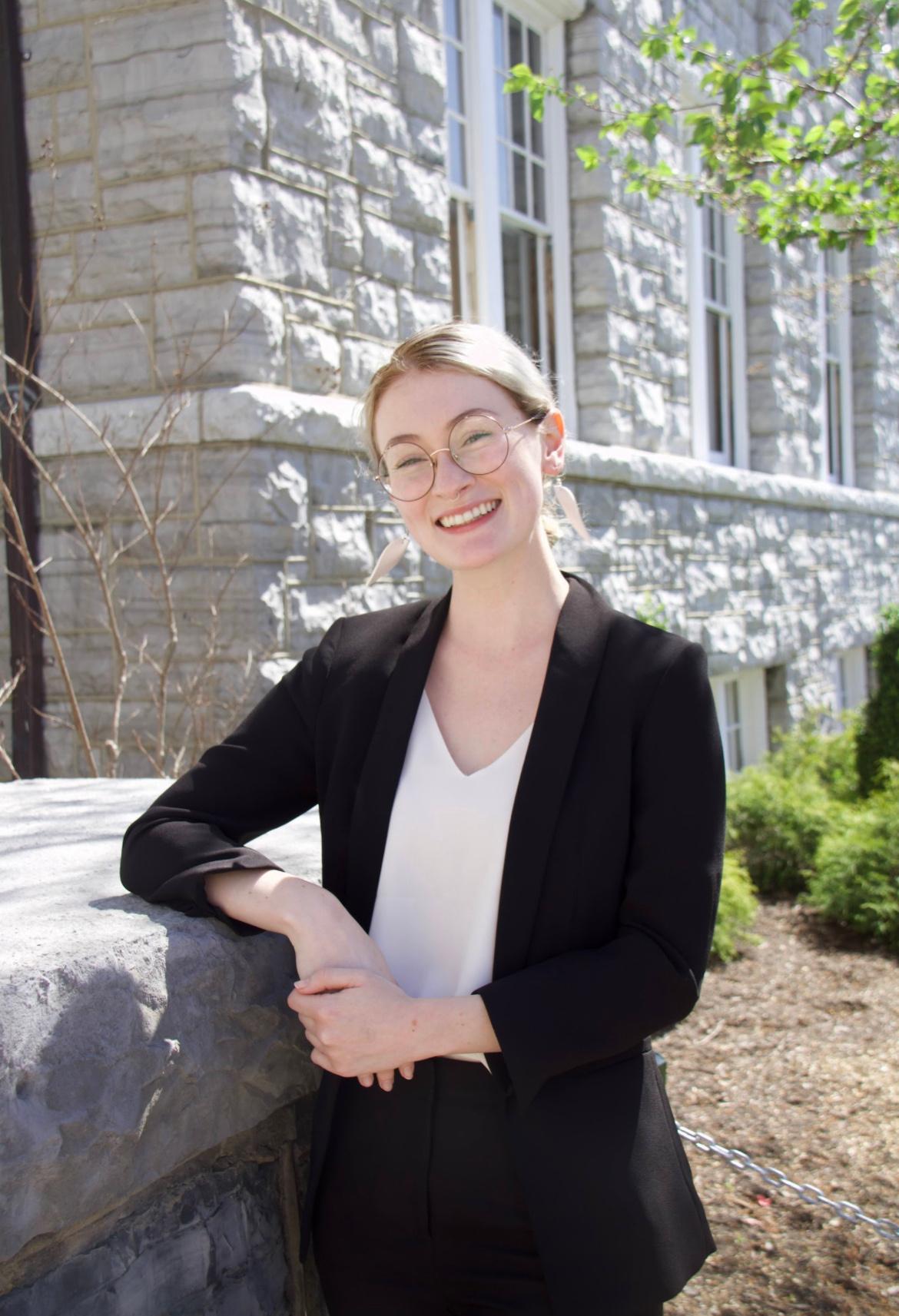
For Tracy, the Anthropology program is accomplishing exactly what it’s meant to — “Students find something in Anthropology, in the ways that humans have lived, that gives them hope for different paths for the future.”
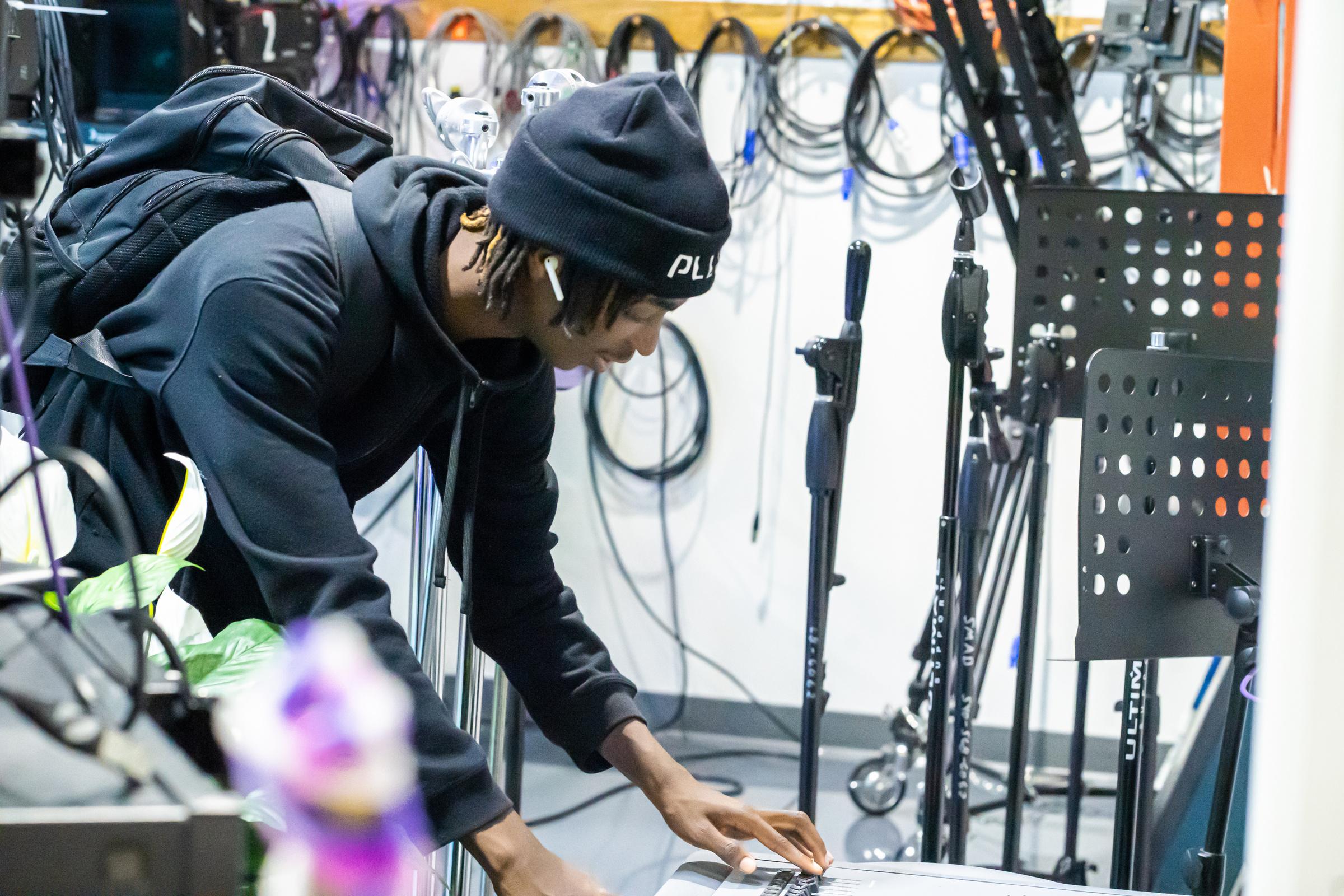
Future Dukes Visit Campus
On a sunny Thursday morning in November 2022, approximately twenty students from Dunbar High School in Washington D.C. traveled for a daylong visit to the JMU campus, accompanied by their Career and College Advisor, JMU Alum Sekenia Welch (Kinesiology, ‘99), their Senior School Counselor, Ms. Lyndel Niles, and JMU faculty member, Dr. Edna Reid. Reid coordinated the visit with Siân White, Associate Dean, and Karina Kline-Gabel, Assistant Dean, with sponsorship from the College of Arts and Letters, the Office of Admissions, and the Center for Multicultural Student Services (CMSS).
Students began the day with an Arts and Letters welcome reception and a tour of the Alison Bailey Parker Studio, part of the Media Arts and Design facilities in Harrison Hall. Students headed to the sound stage to experience the green screen and news desk in front of the camera, and to the control room for behind-the-scenes production. What a joy to share these learning spaces with potential Dukes! Afterwards students visited CMSS to hear from current JMU students and see the spaces available at the Student Success Center.
 Casey Brewer ('23), recipient of the Henry Fong Award 2022.
Casey Brewer ('23), recipient of the Henry Fong Award 2022.
ARTS AND LETTERS REVIEW | 12
JMU Latinx Conference SOMOS
The inaugural “ JMU Latinx Conference: Collaborations Across the Commonwealth” (October 2022), directed by our own Assistant Dean, Karina Kline-Gabel, headlined with a conversation between Dean Robert Aguirre and Latina activist and civil-rights icon, Dolores Huerta. She highlighted the importance of collaboration and civic engagement – hearing all voices, voting, and then holding leaders accountable.
Current student Eve Wilkie (‘25), who attended with her classmates, said, “The conference with keynote speaker Dolores Huerta was a oncein-a-lifetime opportunity and truly a day I will never forget. Hearing and seeing the passion within Huerta vividly illustrated the themes we touched on in class.”
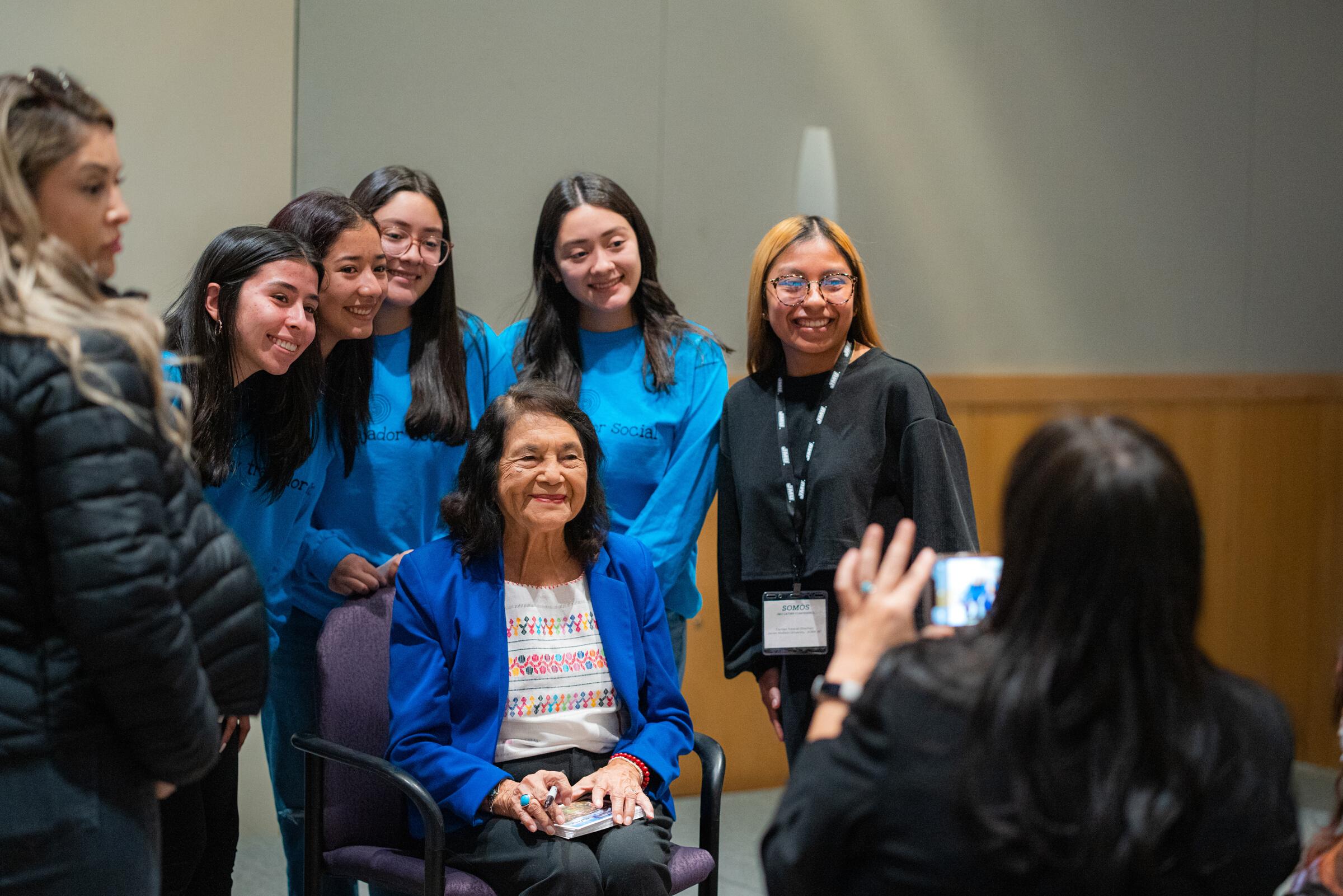
SOMOS
Programmed by the College of Arts and Letters and the Madison Hispanic Caucus, the event gathered more than 300 JMU students, faculty and administrators, Latinx community members, and state and local leaders to explore issues facing the Latinx community.

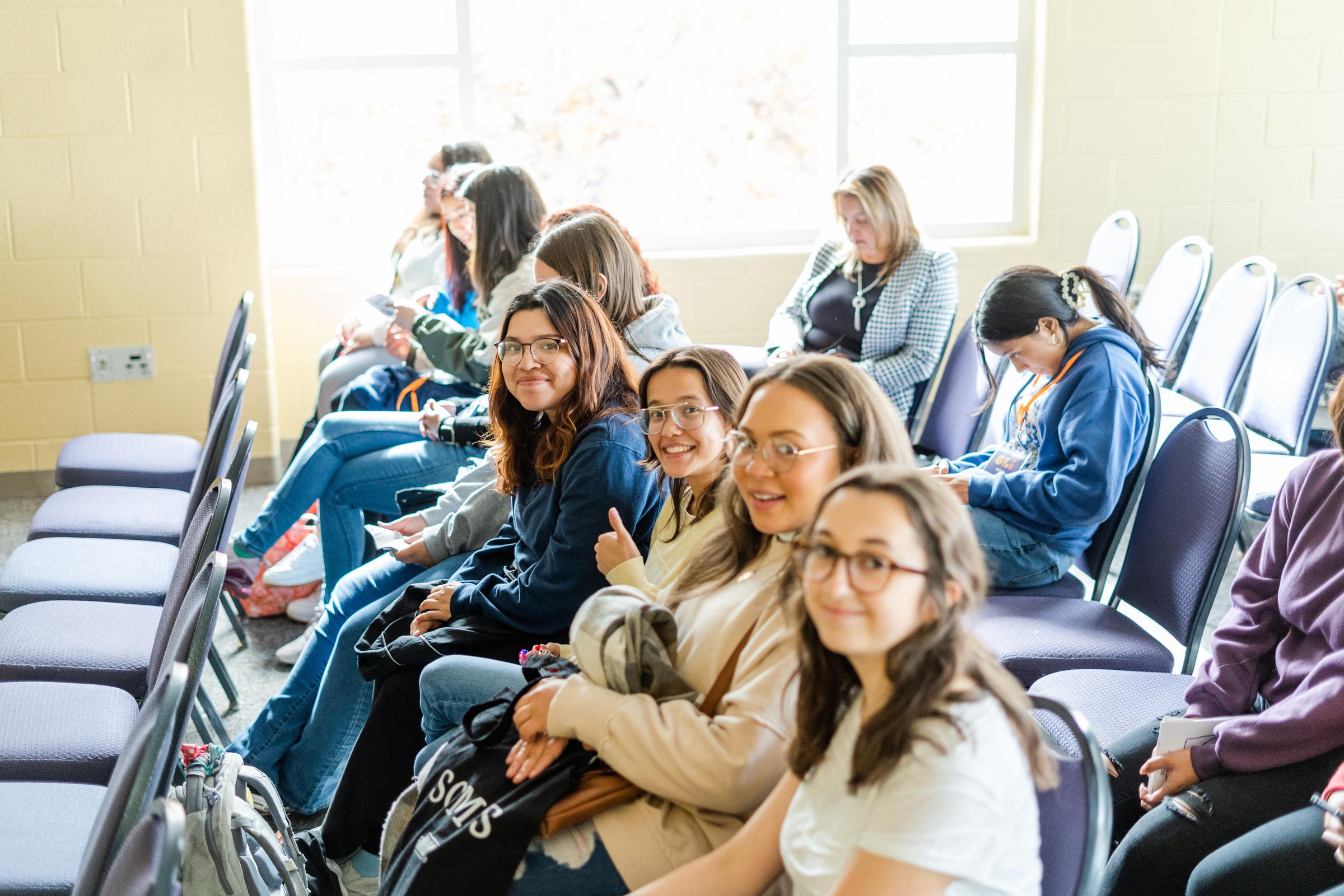
SOMOS
Presenters included special guests Delegate Alfonso López, Delegate Elizabeth Guzmán, and Dr. Irma Becerra, President of Marymount University, the only Hispanic-serving Institution in Virginia. The Madison Collection also displayed artifacts from its Mesoamerican and Latin American collection.
13 | JMU COLLEGE OF ARTS AND LETTERS
SOMOS
“The conference with keynote speaker Dolores Huerta was a once-in-a-lifetime opportunity.”
- Eve Wilkie ('25)
Dr. Tiffany González, Assistant Professor of History, was selected as a Clements Fellow for the Study of Southwest America for her project “Representation of Change: How Chicanas Reshaped the American Political Process in the Late Twentieth Century.” In Fall 2021, González joined JMU’s History Department as part of the college’s Racial and Social Justice Cohort hire. Her research explores the intersection of MexicanAmerican/Chicana/Latinx and gender studies, and incorporates methods of history, political science, and Latin American studies.
“Dr. González is a stellar researcher and teacher,” said Maura Hametz, Academic Unit Head and Professor of History. “[González’s] award-winning work is infused with an understanding of the recent American past that engages the public and academia alike in rethinking our American values, challenges, and aspirations for the future.”
González also received the 2022 Lerner-Scott Prize from the Organization of American Historians for the best doctoral dissertation in U.S. women’s history and an eight-week Mellon-Schlesinger Summer Research Residency at the Radcliffe Institute of Harvard University.

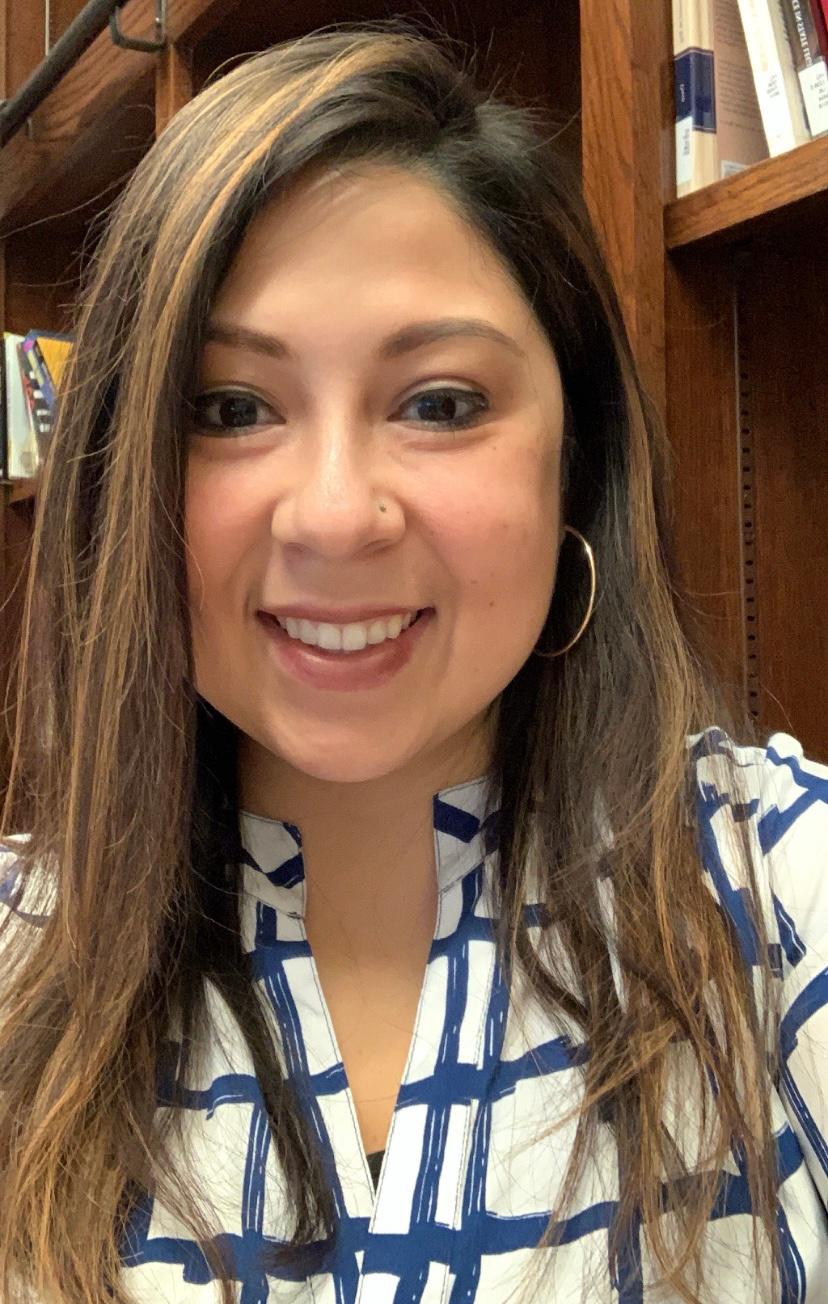
ARTS AND LETTERS REVIEW | 14
Director of Prof
Early in 2022, the College of Arts and Letters Dean’s office created a new position to serve student employment needs: the Director of Professional Development and Engagement. The position answers a call across higher education for internship experience, professional development, and career readiness. We are delighted to announce that Shannon Wilson has been appointed to serve in this role. The director is charged with facilitating our current students’ transition from college to careers and harnessing the generosity and enthusiasm of alumni, the college’s best resource for current students seeking next steps after graduating.
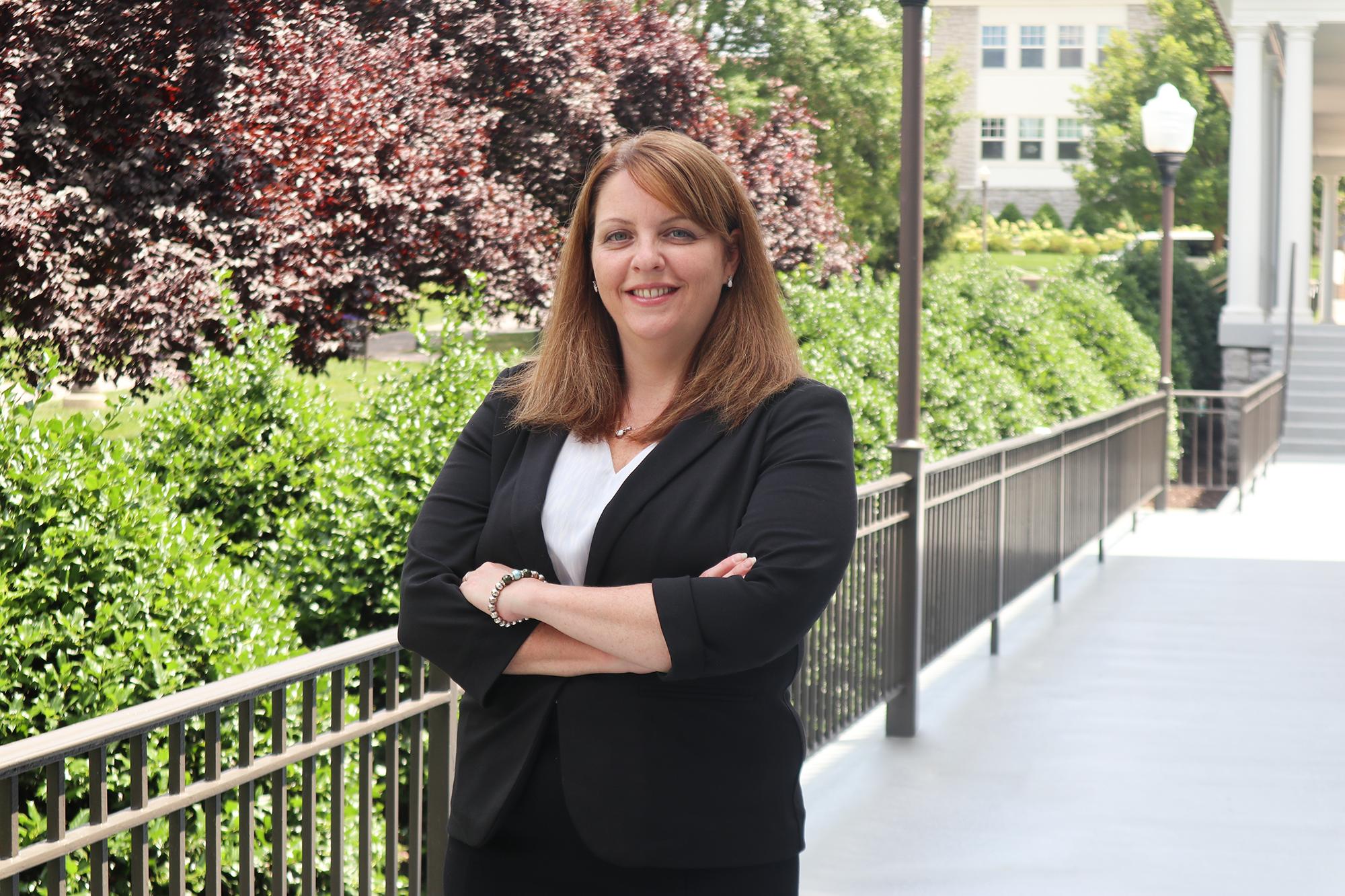
Arts and Letters students are excellent critical thinkers and communicators, often keen to pursue justice and ethical change. As employees, they are adaptable and eager to learn. Our graduates have a wide range of opportunities within any sector they choose — we have alums with literature degrees who work in high tech; French majors that run consulting firms; former Breeze reporters that lead corporate communications for major sports teams; and many more leaders in their fields. Wilson will carry that message to students and employers alike.
Wilson brings a wealth of talents and experience to her role. With a bachelor’s degree in Business Management and Organizational Development and a master’s degree in Educational Technology, she grasps the languages of both the university and the working world. She also brings an extensive network of relationships and varied work experience, which includes hiring and training students. Her joy lies in helping each student find the right path.
As Director, Wilson chairs a professional development committee with college-wide faculty representation to understand student needs in
each major and to coordinate efforts across the college. She will plan and lead activities such as career treks to Richmond for pre-law students and to Washington D.C. for students interested in the Federal Government sector. She is also helping to establish a new internship program through the Innovation Center for Youth Justice, which places JMU Youth Justice, Justice Studies, or Social Work students in jurisdictions across the nation.
Wilson will be reworking the once-biennial Career Conference to offer it annually. This year’s conference takes place February 23-24, and will feature alumni panels and workshops about internships, job searches, interviewing, workplace culture, and marketing skills that employers most value. She is also partnering with the University Career Center’s college liaison, Emma Gibbons, and with departments and college-affiliated alumni boards, to expand programming and enable alumni to connect with their home departments and each other. Alumni interested in supporting these initiatives can contact Wilson directly at wilso4sl@jmu.edu
15 | JMU COLLEGE OF ARTS AND LETTERS
NEW
IN THE
DEAN'S OFFICE
Faculty
Fellows & Digital Initiatives
This fall, the College of Arts and Letters launched a dean’s office faculty fellows program to build additional leadership capacity in the college. Faculty fellows will work with the college leadership team, unit heads, faculty, and campus partners to advance three college priorities: faculty research, global engagement, and digital literacy.
Dr. Michael Gubser (History), the new Research, Scholarship, and Creative Activities (RSCA) Faculty Fellow, will cultivate a faculty learning community, develop scholarship-related programming, mentor faculty members, and facilitate cross-college communication about research and creative activities. Gubser has earned several significant research-support grants, most recently a fellowship from the Guggenheim Foundation.
Professor Dietrich Maune (SMAD), our first Global Engagement Faculty Fellow, is responsible for internationalizing the curriculum, facilitating recruitment and retention of international students, faculty, and staff, and developing study abroad and other global programming. Maune served six years as director for JMU’s Semester in London program and two years as interim Executive Director of the Center for Global Engagement.
Dr. Andrew Witmer (History), the inaugural Digital Initiatives in Arts and Letters (DIAL) Faculty Fellow, will enhance Arts and Letters’ institutional footprint in digital teaching and scholarship, particularly through innovation in the curriculum. Witmer co-founded the faculty-driven Networked Humanities Institute (2014-2019) at JMU.



Witmer will be working closely with Dr. Joost Burgers (English), who recently joined JMU as our Arts and Letters Digital Humanities/Social Sciences Faculty Scholar. In that role, Burgers will coordinate and raise the profile of digital humanities efforts within the college, bringing significant expertise in the field: Burgers directs an NEH grant to develop interactive learning modules for digital humanities projects and serves as Associate Director of Digital Yoknapatawpha at University of Virginia.

ARTS AND LETTERS REVIEW | 16
Celebrating 25 Years o Connections in D.C.
The Washington Semester Program recently celebrated its 25th anniversary with a gathering of over 100 people at the JMU Washington Center’s Dupont Circle location. The center is the university’s home in the nation’s capital and the site for Washington Semester classes and offices.




“The ability to pursue a full-time internship in the nation’s capital is what draws students to Washington Semester,” said program director Dr. David Jones, Professor of Political Science, “but what makes the experience so powerful are the connections students make with alumni, faculty, and – most importantly – each other. The 25th anniversary was a spirited celebration of those connections.”
The program includes semester-length internships with a variety of influential figures and businesses, including congressmen, senators, marketing agencies, law firms, and more. Students also benefit from on-site courses, panel discussions featuring professionals in various sectors, cultural activities, and networking opportunities with JMU alumni working in the D.C. area.
This past Giving Tuesday, 82 donors raised more than $10,000 to support the JMU Washington Semester Scholarship, exceeding the program’s goal and ensuring more students can participate in this unique experience in the coming years.
17 | JMU COLLEGE OF
AND LETTERS
ARTS
Politic
College of Arts and Letters alum Paul Holland (Political Science and Public Administration, ‘82) and his wife, Linda Yates, have invested $5 million in JMU, the largest cash gift in the university’s history. The Silicon Valley couple have dedicated part of the gift to creating a Faculty Support Endowment in Political Science for ongoing faculty research. The Endowment honors one of Holland’s favorite professors, Dr. Doug Skelley, Faculty Emeritus, who was known for his kindness and sound advice.
That balance of academics with humanity seems to characterize Holland’s positive experience at JMU. “When I look at JMU now,” he says, “it really was the gateway to the rest of my life. First was academic maturation, and I think JMU did a very good job there. The second, which I believe is more important, was social maturation — the notion of being able to go there and grow as a person. That’s where JMU excels, where it surpasses other schools.”
The gift also provides scholarships for student recruitment, entrepreneurship, and study abroad, and JMU has renamed Madison Hall “Holland Yates Hall” in the couple’s honor.

New Civic Engagement Scholarship

The Westmoreland Davis Memorial Foundation has given $48,000 to establish the Morven Park Scholarship in the James Madison Center for Civic Engagement. Beginning in the 2023-2024 academic year, four freshmen who participate in the center’s activities and events will receive scholarships of $3000 each per year, renewable for four years.
Join us February 19th-24th for a week of giving!
REACHING NEW HEIGHTS
ARTS AND LETTERS REVIEW | 18


@JMUCAL
Harrison Hall, MSC 2105, 54 Bluestone Drive Harrisonburg, Virginia 22807



 Dr. Robert D. Aguirre, Dean of the College of Arts and Letters
Dr. Melinda Adams, Associate Dean, Professor of Political Science
Dr. Robert D. Aguirre, Dean of the College, Professor of English
Becca Evans, Communications & Marketing Specialist, College of Arts and Letters
Karina Kline-Gabel, Assistant Dean, Lecturer in Foreign Languages, Literatures, and Cultures (Spanish)
Megan Nicole Medeiros Communications & Marketing Specialist, Furious Flower Poetry Center
Dr. Siân White, Associate Dean, Professor of English
Shannon Wilson Director of Professional Development and Engagement
Laura Wisman Administrative Assistant, College of Arts and Letters
Dr. Robert D. Aguirre, Dean of the College of Arts and Letters
Dr. Melinda Adams, Associate Dean, Professor of Political Science
Dr. Robert D. Aguirre, Dean of the College, Professor of English
Becca Evans, Communications & Marketing Specialist, College of Arts and Letters
Karina Kline-Gabel, Assistant Dean, Lecturer in Foreign Languages, Literatures, and Cultures (Spanish)
Megan Nicole Medeiros Communications & Marketing Specialist, Furious Flower Poetry Center
Dr. Siân White, Associate Dean, Professor of English
Shannon Wilson Director of Professional Development and Engagement
Laura Wisman Administrative Assistant, College of Arts and Letters























 Casey Brewer ('23), recipient of the Henry Fong Award 2022.
Casey Brewer ('23), recipient of the Henry Fong Award 2022.
































